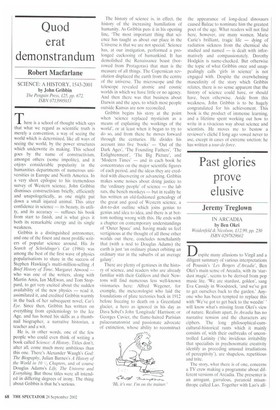Quod erat demonstrandum
Robert Macfarlane
SCIENCE: A HISTORY, 1543-2001 by John Gribbin The Penguin Press, £25, pp. 672, ISBN 0713995033 There is a school of thought which says that what we regard as scientific truth is merely a convention, a way of seeing the world which is determined, like all ways of seeing the world, by the power structures which underwrite its making. This school goes by the name of constructivism, amongst others (some impolite), and it enjoys considerable popularity in the humanities departments of numerous universities in Europe and North America. In a very short epilogue to his tremendous survey of Western science, John Gribbin dismisses constructivism briefly, efficiently and unapologetically, as one might put down a small injured animal. This utter confidence in science — its beauty, its utility, and its accuracy — suffuses his book from start to finish, and is what gives it both its remarkable energy and its single weakness.
Gribbin is a distinguished astronomer, and one of the finest and most prolific writers of popular science around. His In Search of Schrodinger's Cat (1984) was among the best of the first wave of physics popularisations to share in the success of Stephen Hawking's multi-million-selling A Brief History of Time. Margaret Atwood — who was one of the writers, along with Martin Amis, Ian McEwan, and Tom Stoppard, to get very excited about the sudden availability of the new physics — read it, assimilated it, and credited Gribbin warmly in the back of her subsequent novel, Cat's Eye. Since then, Gribbin has written on everything from epidemiology to the Ice Age, and has honed his skills as a thumbnail biographer, a narrative historian, a teacher and a wit.
He is, in other words, one of the few people who could even think of writing a book called Science: A History. Titles don't, after all, come much more ambitious than this one. There's Alexander Waugh's God: The Biography, Julian Barnes's A History of the World in 10 )12 Chapters, and of course Douglas Adams's Life, The Universe and Everything. But those titles were all intended in differing degrees of irony. The thing about Gribbin is that he's serious. The history of science is, in effect, the history of the increasing humiliation of humanity. As Gribbin puts it in his opening line, 'The most important thing that science has taught us about our place in the Universe is that we are not special.' Science has, at our instigation, performed a prolonged cuckooing of humankind. It has demolished the Renaissance boast (borrowed from Protagoras) that man is the measure of all things. The Copernican revolution displaced the earth from the centre of the universe. The microscope and the telescope revealed atomic and cosmic worlds in which we have little or no agency. And then there was that business about Darwin and the apes, to which most people outside Kansas are now reconciled.
Gribbin begins his story at the point when 'science replaced mysticism as a means of explaining the workings of the world', or at least when it began to try to do so, and from there he moves forward through the centuries. He divides his account into five 'books — 'Out of the Dark Ages', 'The Founding Fathers', 'The Enlightenment', 'The Big Picture', and 'Modern Times' — and in each book he concentrates on the major scientific figures of each period, and the ideas they are credited with discovering or advancing. Gribbin makes some noises about doing justice to the 'ordinary people' of science — the lab rats, the bench monkeys — but in reality he has written an old-fashioned genealogy' of the great and good of Western science, a dot-to-dot outline which joins genius to genius and idea to idea, and there is at bottom nothing wrong with this. He ends with a chapter on contemporary understandings of 'Outer Space' and, having made us feel vertiginous at the thought of all those other worlds out there, concludes nonchalantly that (with a nod to Douglas Adams) the earth is just 'an ordinary planet orbiting an ordinary star in the suburbs of an average galaxy'.
There are plenty of geniuses in the history of science, and readers who are already familiar with their Galileos and their Newtons will find numerous less well-known visionaries here: Alfred Wegener, for example, the meteorologist who laid the foundations of plate tectonics back in 1912 before freezing to death on a Greenland glacier, a hero as ignored in his day as Dava Sobel's John 'Longitude' Harrison; or Georges Cuvier, the flame-haired Parisian palaeoanatomist and passionate advocate of extinction, whose ability to reconstruct
the appearance of long-dead dinosaurs caused Balzac to nominate him the greatest poet of the age. What readers will not find here, however, are many women. Marie Curie's brilliant, tragic life — dying of radiation sickness from the chemical she studied and named — is dealt with informatively and compassionately. Dorothy Hodgkin is name-checked. But otherwise the topic of what Gribbin once and unappealingly calls 'girls in science' is not engaged with. Despite the overwhelming masculinity of the story which Gribbin relates, there is no sense apparent that the history of science could have, or should have, been otherwise. Aside from this weakness, John Gribbin is to be hugely congratulated for his achievement. This book is the product of immense learning, and a lifetime spent working out how to write in a vivacious way about science and scientists. He moves me to bestow a reviewer's cliché I long ago vowed never to use, except in cases of extreme unction: he has written a tour-de-force.


































































































 Previous page
Previous page